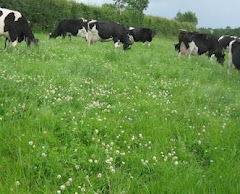
The visit to Gippsland Lean Beef was a great success and huge learning curve for me.
Farmer Dan wholly fulfills my stated Cows in Clover objectives and I can thoroughly recommend his products. He genuinely cares about the life of his animals and I witnessed their idyllic lifestyle first hand.
Farmer Dan is a Horticulturist by trade and he incorporates this knowledge into his approach.
Gippsland is a beautiful area and here are some of my pictures of the visit.
PESTICIDES
Pesticides are not used on the farm at all. Rotating sheep and cattle fertilises the paddock and controls weeds. Dan explained that thistles are deep rooted and bring nutrients to the surface and cows eat them when they start to die off which keeps control of the situation.
ANIMAL WELFARE
A number of methods are used to ensure the best possible quality of life for the animals. A nearby abattoir is used to slaughter the animals which minimises the stress of long journeys. Only transporters that don't use cattle prods and who are gentle with the animals are engaged.
Dan uses a nifty system for stress free weaning of calves and lambs. In commercial farming, calves and lambs need to be weaned from their mothers earlier than in nature otherwise the mother will lose condition. In many farms babies are simply separated from their young which is very distressing for both the mother and baby. Mum's will moan and bellow sometimes for days at a time and kick fences trying to get to the baby she is pining for. It is a very sad scene that factory farmed animals continually relive throughout their lives.
Dan leaves weaning as late as possible and then applies a harmless ring to the young one's nose. The ring is plastic with spikes that dig and tickle the mother when the offspring try to suckle. She nudges the young away just as she does when she is ready to wean . This way the bond is subtly broken and the mother can continue to be healthy.
The cows roam in roomy pastures with dotted trees and plenty of drinking reserves and not that the cows care but picturesque scenery also. When we arrived at the paddock the cattle eagerly ran up to meet us and surround us. They are not tame, when you move towards them they shy away but they have a healthy curiosity and a hopefulness that food is on offer despite the abundance of lush green grass at the moment. They are social and frolic amongst themselves whilst keeping an eye out in case we decide to offer food. The sheep were off in the distance but looked similarly content.
FEED
All stock is free range and grass fed but in times of drought and winter they must have supplemental feeding. This is where I learnt the most. Have you ever seen the fancy labels that boast grain fed beef? Cows are ruminant animals this refers to their digestive system, four stomachs and a process that involves regurgitation for reprocessing, 'chewing cud"and fermentation. This process creates healthy bacteria that keeps the animal healthy by enabling it to absorb nutrients. Wheat cannot be processed in this way and gives the animal acidosis and enterotoxemia. Farmers who grain feed then have to medicate to combat this unhealthy reaction. Often when you deviate from a natural process it creates unhealthy consequences which then need to combated. This can be said about many things in life where we choose unnatural processes over natural.
Dan harvests his own organically grown hay. He also grows feed like sorghum which is like a lentil and is suitable for ruminant animals. Dan showed me the remnants of the sorghum paddock. After harvesting the sorghum Dan let the cows loose in the paddock where the stalks were over two metres high. The image he painted was like happy pigs in mud. The cows ate their way from the outside into a wall of delicious nutritious stalks. What a happy scene.
In addition Dan feeds lupins. Lupins are a high protein superior quality feed. It is more expensive than wheat but it is far more healthy for the animal and does not cause digestion problems.
CERTIFIED ORGANIC
Dan doesn't use antibiotics, he doesn't need to because he keeps his animals healthy naturally so their immune systems are strong. He refuses to use hormones. Female hormones are regularly used in factory beef production on steers (male cows) to fatten them for slaughter and calm them down so they can be kept in close confines. Dan uses no pesticides and employs sustainable and humane farming practices so why does he choose not to be Certified Organic? Dan explained that he doesn't agree with some loopholes in the certification process that allows for instance grain feeding but at the end of the day it is too expensive. There are numerous application fees, auditing fees then compliance costs, extra workload and then the certifiers want an ongoing percentage of his profit.
I feel very confident to recommend Dan's meat. He really cares about the animals and spends extra time, effort and money to give them a great quality of life and to ensure a natural healthy product. His meat is extremely good value particularly when you buy in bulk. I haven't tried his meat yet but I do have a couple of friends who have and they raved about the quality. Anyway I will be ordering some meat this week so I can tell you all about it then.
Please check out his website for more information http://www.gippslandleanbeef.com.au/
To purchase go to the online store to get his meat home delivered to the Melbourne Metro area only http://thefarmersmarket.com.au/shop/index.php?main_page
Get a group of friends together one of whom is home during the day to receive the delivery and buy in bulk to save.






